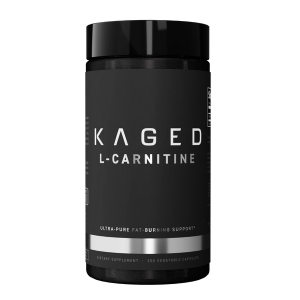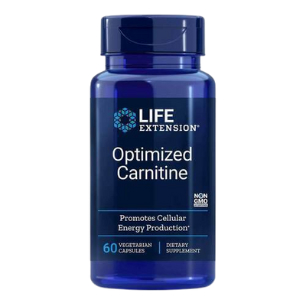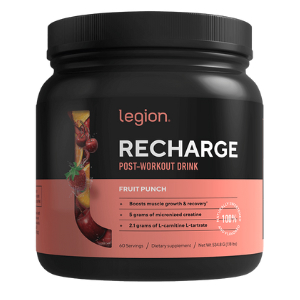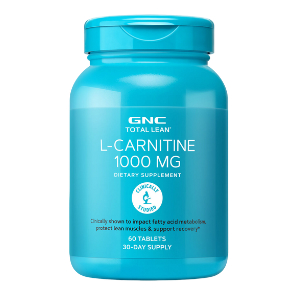6 Best L-Carnitine Supplements To Boost Your Training 2024
All articles are produced independently. When you click our links for purchasing products, we earn an affiliate commission. Learn more about how we earn revenue by reading our advertise disclaimer.

Jacked Factory Burn-XT
- Current Good Manufacturing Practices (cGMP)-certified
- No fillers or dyes
- Vegetarian-friendly

Jacked Factory Growth Surge
- Stimulant-free, Sport banned substance tested
- Vegetarian-friendly, unflavored
- Non-GMO

Life Extension Optimized Carnitine
- Three forms of L-carnitine
- Vegetarian-friendly
- Non-GMO
L-carnitine supplementation is used to boost your exercise performance, reduce muscle soreness, to promote weight loss, and to improve brain health, such as in Alzheimer’s Disease[1].
The most common use of L-carnitine is as an ingredient in fat burners. A fat burner often has a combination of ingredients that can help you lose weight.
Those are the known uses for carnitine supplements; how much those claims are true depends on who you ask or how much research you do. The manufacturer may claim that their L-carnitine supplements are the ones that will get your energy levels high to boost performance and promote weight loss, but is that what the literature says?
Science, on the other hand, may not always agree, and understanding how L-carnitine is made and used in the body can help clarify the use of L-carnitine supplements.
Best L-Carnitine Supplements On The Market In (April. 2024)
- Jacked Factory Burn-XT – Editor’s Choice
- Kaged L-Carnitine – Best High-End
- Life Extension Optimized Carnitine – Best Value
- Jacked Factory Growth Surge – Best In Powder Form
- GNC Total Lean L-Carnitine – Best For A Variety Of Ingredients
- Legion Recharge – Best For Transparent Ingredients
What Is L-Carnitine?
Carnitine is an amino acid derivative made from the amino acids lysine and methionine. It is considered a “conditionally essential” nutrient since the body can only make limited quantities of it and not always as much as is needed.
The amino acids don’t just make one type of carnitine. The amino acids, during different processes, can create four forms of carnitine: pure L-carnitine, pure acetyl L-carnitine, propionyl-L-carnitine, and L-carnitine L-tartrate. Each form has its own varying degrees of absorption. The most researched is acetyl-L-carnitine for its increased absorbability and ease of passing through the blood-brain barrier (passing into the brain tissue[2]). Acetyl L-carnitine will be what you will often come across, but you may also have a combination of others included.
Its most important role is in energy production, which helps transport fatty acids to make energy, specifically the long-chain fatty acids, into the powerhouse within our cells, the mitochondria.
The mitochondria are like a power plant, and the long-chain fatty acids are crude oil. The crude oil is converted to fuel like gasoline or diesel in the power plant. So if you need that fuel to be made in the body, you send fatty acids into the mitochondria to create that energy.
6 Best L-Carnitine Supplements For Bodybuilding In 2024
Jacked Factory Burn-XT
A fat burner that is vegetarian-friendly helping to boost energy, metabolism, and reduce body fat.
- Current Good Manufacturing Practices (cGMP)-certified
- No fillers or dyes
- Vegetarian-friendly
- Contains a moderate amount of caffeine
- Reported side effects of extreme stomach ache
Jacked Factory Burn-XT is a thermogenic fat burner with ingredients that help stimulate body fat loss. It includes acetyl L-carnitine, which promotes fatty acid transport to maximize fat burning[3].
Other ingredients include green tea extract, caffeine anhydrous, Capsimax cayenne pepper extract, and BioPerine. These ingredients together enhance energy through various mechanisms.
This supplement is made in the USA, manufactured in a cGMP-compliant facility, and has no fillers or dyes. You can get this supplement in capsule form with a 30-day supply. It contains 135 milligrams (mg) of caffeine and may cause stomach aches.
It’s recommended you do an initial dose of one capsule per day for three days to assess tolerance. Once tolerated, you may take one to two capsules per day before a meal or with a meal. Avoid taking the supplement four hours before bedtime, and do not exceed recommended dosage.
You can purchase this supplement once or obtain a discount by subscribing and adding additional savings with bulk supplements purchase. The initial order is 25% off and 15% off every recurring order. There is a 90-day money-back guarantee on the first purchase by returning the product within 90 days.
Kaged L-Carnitine
A stimulant-free L-carnitine supplement that can help burn fat and reduce post-workout soreness.
- Stimulant-free, Sport banned substance tested
- Vegetarian-friendly, unflavored
- Non-GMO
- Contains L-carnitine L-tartrate
- Unknown ingredient potency in Carnipure®
- Dosage is high, two capsules three times daily
Kaged offers a pure L-carnitine L-tartrate product in a 500 mg serving size per pill; no other ingredients are added except some B vitamins. The ingredient is patented as Carnipure®; If you are looking for just one single ingredient supplement with a dash of B vitamins, this can be an option. It can help with enhanced recovery, is non-GMO, and is third-party tested, including every batch tested for the sport-banned substances.
The recommended dosage is two capsules, three times per day, anytime during the day for non-workout days, without food. When working out, you can use it as a pre-workout and take it 30-60 minutes before a workout. You get a 30-day money-back guarantee, return the product with more than 50% still in the container, and you will get store credit or your money back.
Jacked Factory Growth Surge
A post-workout powder that includes a variety of ingredients for muscle tissue building, recovery, and reduce stored body fat.
- cGMP-certified facility
- No fillers or dyes
- In powder form
- High dose of L-carnitine L-tartrate (2 grams per serving)
- Contains artificial sweeteners sucralose and acesulfame potassium
Jacked Factory Surge aims to reach those who want to increase muscle growth and improve recovery after a workout. One of its ingredients, L-carnitine L-tartrate, is added to increase recovery from a workout. This L-carnitine powder can be an option if you are not interested in taking it in capsule form.
Typically you will see L-carnitine as the only ingredient; in the case of Jacked Factory Surge, they add L-carnitine L-tartrate to creatine monohydrate, plus betaine anhydrous and top the formula off with BioPerine.
In a small study[4], ten subjects were used to investigate the possible benefits of this supplemental form of L-carnitine L-tartrate; half were given L-carnitine L-tartrate, and the other half a placebo. The study showed promising results in reducing the amount of muscle tissue damage. L-carnitine L-tartrate has been shown[5] in other studies to help in hypoxic muscle recovery after working out.
The ingredient formulary includes artificial sweeteners. Sucralose, in particular, has been shown[6] to upset the microbiome of the gut and to cause blood sugar increases. A study[7] was done on mice treated with acesulfame potassium, and it also showed an altered gut microbiome as well as body weight gain in the subjects.
To take this post-workout product, you mix one scoop with 16 ounces (oz) of water after your workout. On non-training days take one scoop with 16 oz of water in the morning. This supplement can be purchased once or get a discount by subscribing. The initial order is 25% off and 15% off every recurring order. There is a 90-day money-back guarantee for the first purchase by returning the product within 90 days.
Life Extension Optimized Carnitine
You get three forms of L-carnitine to optimize absorption and the body’s use of L-carnitine.
- Three forms of L-carnitine
- Vegetarian-friendly
- Non-GMO
- May be too stimulating for some
Life Extension offers an L-carnitine supplement that includes acetyl L-carnitine HCL[8], acetyl L-carnitine arginate Di-HCL, and glycine propionyl L-carnitine HCL. Together, these ingredients help you recover from exercise quicker, decrease muscle fatigue, support heart health, improve brain function, and optimize nervous system health.
This is a non-GMO supplement and is vegetarian-friendly. You can purchase this supplement once or subscribe for automatic shipping and save 11%. It’s the best form of L-carnitine supplement for its different L-carnitine types, that may increase absorption and use by the body.
The recommended dosage is to take two capsules once or twice a day or as recommended by your healthcare practitioner. This product is versatile because you can take it in the morning with an empty stomach, water, or juice. You can also take all the doses at once or divide. Do not exceed the recommended dose. You get a 12-month return policy; just return the product, which may be replaced or your account credited.
GNC Total Lean L-Carnitine
GNC provides L-carnitine and other vitamins to help optimize fatty acid metabolism. It also includes a low amount of caffeine for a boost of energy.
- Contains additional vitamins
- Low amounts of caffeine
- Supports fatty acid metabolism
- Contains L-carnitine L- tartrate
- Capsules may be too large
- Niacin may cause a flushing reaction
GNC’s Total Lean L-carnitine comes with ingredients to help with fatty acid metabolism[9], help fuel muscle recovery, and help you take control of your weight loss goals. You will find that this supplement contains one gram of L-carnitine tartrate, niacin (B3 vitamin), Garcinia Cambogia, green coffee bean extract, green tea leaf extract, and black pepper fruit extract, and the blend Capsimax®.
Although you have a variety of stimulants added to this supplement, they are low stimulants at 9mg per serving, which is low enough that it may not cause jitteriness. Some noted side effects are flushing from the niacin, and capsules may be too large.
The recommended dose is two capsules once daily; take it 30-60 minutes before a workout. On non-training days, take two capsules in the morning. You can make a one-time purchase or subscribe and save 10%. You get a 30-day money-back guarantee; return the product for a refund of the product price minus the shipping, handling, or other charges.
Legion Recharged

In a drinkable form, you can get a strawberry lemonade post-workout drink that includes ingredients for more muscle strength, faster recovery, and less soreness.
- No artificial dyes, no artificial sweeteners
- Third-Party lab-tested
- In powder form
- Produced in a facility where major food allergens are present
Legion Recharged offers a post-workout powder; if you are looking for an L-carnitine powder form, this is a good option. it contains all other ingredients to help increase muscle and strength, improve recovery, and reduce muscle soreness. The ingredients are micronized creatine, a form that is more water-soluble and easy to digest, L-carnitine L-tartrate, and corosolic acid (Banaba Leaf Extract).
This post-workout powder claims to not use artificial dyes or sweeteners; the sweetener used comes from the stevia plant (Stevia Rebaudiana).
It’s also third-party tested and certified by Labdoor; this makes it the best L-carnitine brand for its efforts to make sure they provide what they promise. You can buy this supplement on its own, subscribe and save 10%, or buy bulk supplements for an additional 10% discount.
The recommended dose is one scoop with 10 to 12 ounces of water and with a post-workout meal. On non-training days take this supplement with the largest meal of the day. You get 365 days to request a refund; no product return is necessary, although this return policy only applies for a first-time purchase.
Benefits of Carnitine
There is extensive research that L-carnitine helps in the areas of aging, cardiovascular health, cancer, type 2 diabetes, HIV and AIDS, End-Stage Renal Disease, and athletic performance.
A study[10] suggests that the benefits of L-carnitine supplements in the form of acetyl-L-carnitine can improve cognitive function and reduce deterioration in older adults that have cognitive impairment or that have Alzheimer’s.
In relation to cardiovascular diseases such as peripheral arterial disease (poor blood circulation in the legs), which can significantly reduce the ability to walk. The use of propionyl-L-carnitine has been shown to significantly improve walking distance[11] by improving blood flow, thus providing a cardiovascular benefit.
People with cancer can experience fatigue from chemotherapy and low appetite that may result in poor nutrition; they have also been shown to be carnitine deficient[12]. Providing a cancer patient that is on chemotherapy with a carnitine supplement has shown to help with fatigue, improve mood, and normalize L-carnitine levels in the blood[13].
A person with type 2 diabetes has difficulty with insulin levels and controlling sugar levels. There is early research that indicates that taking a carnitine supplement can improve insulin sensitivity[14]. The use of acetyl-L-carnitine as a supplement for one year resulted in diabetes symptoms like reduced nerve pain and improved perception of vibrations for people with diabetic neuropathy[15].
In a person with HIV/AIDS, the accumulation of fat varies in locations and can increase the amount of fat in the blood and insulin resistance. This combination is known as lipodystrophy syndrome; this syndrome plus the HIV and antiretroviral drugs can cause toxicity to the mitochondria and lead to carnitine deficiency[16]. This deficiency creates a loop that does not allow for fat metabolism, but the way it works is unknown.
A person diagnosed with End-Stage Renal Disease (ESRD), where the kidneys are no longer doing their job to regulate waste and excess fluids, or a person on hemodialysis, a treatment to help regulate waste and fluids from ESRD may result in depleted carnitine levels[17].
The most popular use is usually for athletic purposes, to boost exercise performance, and aid in weight loss; therefore, the reason supplement companies sell L-carnitine supplements. The reasoning is that carnitine plays a role in making energy, which in theory, if supplemented, could provide the necessary extra boost needed for exercise performance.
Carnitine has been studied extensively[18], and many studies record blood level changes of carnitine. Yet many questions remain unanswered; some questions to be answered, How do L-carnitine supplements get used in the body versus the L-carnitine made by the body? How much do you really need? What is an appropriate dosage? Also, how real are its claims that by supplementing, you can boost energy, lose weight or improve exercise performance?
Best Time to Take L-Carnitine Supplements
There isn’t an official recommendation of when to take L-carnitine; each manufacturer has its own recommendations based on the additional ingredients in the supplement.
In supplements that only have L-carnitine, the recommendation on average is to take 30-60 minutes before a workout, and on non-workout days it can be taken in the morning.
What to Look For in the Best L-Carnitine Supplement
Dosage
The Food and Nutrition Board (FNB) of the National Academies concluded that carnitine is not an essential nutrient; therefore, there aren’t any Dietary Reference Intakes (DRI)[19] which means that the supplement industry may not have a reliable or credible source to base their dosage amounts on. Carnitine is deemed a “conditionally essential” nutrient meaning that although our body can make it, there are some circumstances where it can’t keep up with the need; thus, it becomes essential to get it from an outside source such as the diet or a supplement.
The standard dose found in L-carnitine supplements is between 500 mg to 2000 mg per day. At doses of three grams per day, you may notice a fishy odor, have nausea or vomiting, and become weak.
Conditions that may require a carnitine supplement[20] include anorexia, chronic fatigue, coronary vascular disease, Diphtheria, hypoglycemia, muscular disorders, and male infertility.
Price
A supplement with L-carnitine added can range in price from $22.50 to $39.99. The range can mean many things related to the different types of ingredients added or the quality of the ingredients. Unfortunately, it’s hard to tell what the reasoning is for the pricing.
Third-Party Testing
Supplements are not regulated by the FDA (Food and Drug Administration) and are not required to provide any third-party testing. Some supplement companies, in good faith, will opt to provide third-party testing. The most popular third-party testing companies will be USP (United States Pharmacopeia), (National Sanitation Foundation), NSF International, and ConsumerLabs.com.
Conclusion
It’s important to know that L-carnitine supplementation is not recommended for healthy individuals; the body makes the amount that you need through the amino acids lysine and methionine. If you follow a healthy diet, you should be able to get the amino acids you need to make L-carnitine.
An L-carnitine deficiency is rare and is only seen in two situations: a genetic disease called primary carnitine deficiency and a secondary carnitine deficiency related to a chronic condition. It is also seen in the conditionally essential disorders mentioned above under “Dosage.”.
Also, because L-carnitine is not considered an essential nutrient, a Recommended Dietary Intake is not established; therefore, no known upper limit has been set by the government or scientific institutions. There is extensive research on L-carnitine for all of its possible benefits, but for fat loss and muscle recovery, more research is still needed.
Frequently Asked Questions
Some research indicates L-carnitine is good for weight loss.
According to some manufacturers, you can if it’s the only ingredient. Depending on the type of ingredients included in the supplement, the recommendation may vary.
L-carnitine is naturally concentrated in the heart muscles; therefore, there are no known side effects to the heart when supplementing with L-carnitine. Any excess L-carnitine is excreted through the urine.
There are some reported side effects; in a study[21], it was noted that consuming more than 3 grams of L-carnitine may cause nausea, vomiting, abdominal cramps, diarrhea, and fishy body odor.
+ 21 sources
Health Canal avoids using tertiary references. We have strict sourcing guidelines and rely on peer-reviewed studies, academic researches from medical associations and institutions. To ensure the accuracy of articles in Health Canal, you can read more about the editorial process here
- Kepka, A., Ochocinska, A., Borzym-Kluczyk, M., Skorupa, E., Stasiewicz-Jarocka, B., Chojnowska, S. and Waszkiewicz, N. (2020). Preventive Role of L-Carnitine and Balanced Diet in Alzheimer’s Disease. Nutrients, [online] 12(7), p.1987. doi:10.3390/nu12071987.
- LIU, J., HEAD, E., KURATSUNE, H., COTMAN, C.W. and AMES, B.N. (2004). Comparison of the Effects of l-Carnitine and Acetyl-l-Carnitine on Carnitine Levels, Ambulatory Activity, and Oxidative Stress Biomarkers in the Brain of Old Rats. Annals of the New York Academy of Sciences, [online] 1033(1), pp.117–131. doi:10.1196/annals.1320.011.
- Hagen, T.M., Liu, J., Lykkesfeldt, J., Wehr, C.M., Ingersoll, R.T., Vinarsky, V., Bartholomew, J.C. and Ames, B.N. (2002). Feeding acetyl- l -carnitine and lipoic acid to old rats significantly improves metabolic function while decreasing oxidative stress. Proceedings of the National Academy of Sciences, [online] 99(4), pp.1870–1875. doi:10.1073/pnas.261708898.
- Kraemer, W.J., Volek, J.S., French, D.N. and Keijo Häkkinen (2003). The Effects of L-Carnitine L-Tartrate Supplementation on Hormonal Responses to Resistance Exercise and… [online] ResearchGate. Available at: https://www.researchgate.net/publication/10604648_The_Effects_of_L-Carnitine_L-Tartrate_Supplementation_on_Hormonal_Responses_to_Resistance_Exercise_and_Recovery?enrichId=rgreq-ca7e92ddfcabc39b82b59f3d70af88a7-XXX&enrichSource=Y292ZXJQYWdlOzEwNjA0NjQ4O0FTOjEwMzIzNzMzNjE3NDU5NkAxNDAxNjI1MTA3MzU3&el=1_x_3&_esc=publicationCoverPdf
- cloudfront.net (2021). The effects of L-carnitine L-tartrate. [online] Available at: https://d1wqtxts1xzle7.cloudfront.net/71932914/The_effects_of_L-carnitine_L-tartrate_su20211008-26467-vcw912-with-cover-page-v2.pdf?Expires=1657652939&Signature=fnW9TJPdn3CXdDAeGuraP~5fWH-rwL8OrRCVHW1qsnyI3p9d5Pm3uKN~9HbAVSGUCjwOcyyRFt4EGLNhiQFMeB82vwhGSHvaVqGKKkSkU3sYTh2RluPS25PtUC5crptcVQHnNJOTQRkDdq4T5GyzE-dWmjiKeqWS8XN0zNKVcYMlON90rvyy550kIZRT5JwuBmsSCqiWUDTCqFx73UR0bVAXqXSXAYzJUauiT9b5Y3wjHjr3FwhuKP4DYBinJmapco0FNpKK3Gy7k18KwAypiTX8Ewry59YZ7-UTeOP~Ncg4ycMuxmIUblwGizivLyFKgmCptX-ASgvXVKyO9DpDwA__&Key-Pair-Id=APKAJLOHF5GGSLRBV4ZA
- gilmerm (2021). Is Sucralose (Splenda) Bad for You? [online] Cleveland Clinic. Available at: https://health.clevelandclinic.org/is-sucralose-splenda-bad-for-you/
- Bian, X., Chi, L., Gao, B., Tu, P., Ru, H. and Lu, K. (2017). The artificial sweetener acesulfame potassium affects the gut microbiome and body weight gain in CD-1 mice. PLOS ONE, [online] 12(6), p.e0178426. doi:10.1371/journal.pone.0178426.
- REBOUCHE, C.J. (2004). Kinetics, Pharmacokinetics, and Regulation of l-Carnitine and Acetyl-l-carnitine Metabolism. Annals of the New York Academy of Sciences, [online] 1033(1), pp.30–41. doi:10.1196/annals.1320.003.
- National Institutes of Health (2017). Office of Dietary Supplements – Niacin. [online] Nih.gov. Available at: https://ods.od.nih.gov/factsheets/Niacin-HealthProfessional/.
- Montgomery, S.A., Thal, L.J. and Amrein, R. (2003). Meta-analysis of double blind randomized controlled clinical trials of acetyl-L-carnitine versus placebo in the treatment of mild cognitive impairment and mild Alzheimer??s disease. International Clinical Psychopharmacology, [online] 18(2), pp.61–71. doi:10.1097/00004850-200303000-00001.
- Brass, E.P., Koster, D., Hiatt, W.R. and Amato, A. (2013). A systematic review and meta-analysis of propionyl-l-carnitine effects on exercise performance in patients with claudication. Vascular Medicine, [online] 18(1), pp.3–12. doi:10.1177/1358863×12467491.
- CRUCIANI, R.A., DVORKIN, E., HOMEL, P., CULLINEY, B., MALAMUD, S., SHAIOVA, L., FLEISHMAN, S., LAPIN, J., KLEIN, E., LESAGE, P., PORTENOY, R. and ESTEBAN-CRUCIANI, N. (2004). l-Carnitine Supplementation for the Treatment of Fatigue and Depressed Mood in Cancer Patients with Carnitine Deficiency: A Preliminary Analysis. Annals of the New York Academy of Sciences, [online] 1033(1), pp.168–176. doi:10.1196/annals.1320.016.
- Graziano, F., Bisonni, R., Catalano, V., Silva, R., Rovidati, S., Mencarini, E., Ferraro, B., Canestrari, F., Baldelli, A.M., De Gaetano, A., Giordani, P., Testa, E. and Lai, V. (2002). Potential role of levocarnitine supplementation for the treatment of chemotherapy-induced fatigue in non-anaemic cancer patients. British Journal of Cancer, [online] 86(12), pp.1854–1857. doi:10.1038/sj.bjc.6600413.
- MINGRONE, G. (2004). Carnitine in Type 2 Diabetes. Annals of the New York Academy of Sciences, [online] 1033(1), pp.99–107. doi:10.1196/annals.1320.009.
- Sima, A.A.F., Calvani, M., Mehra, M. and Amato, A. (2005). Acetyl-l-Carnitine Improves Pain, Nerve Regeneration, and Vibratory Perception in Patients With Chronic Diabetic Neuropathy. Diabetes Care, [online] 28(1), pp.89–94. doi:10.2337/diacare.28.1.89.
- DAY, L., SHIKUMA, C. and GERSCHENSON, M. (2004). Acetyl-l-carnitine for the Treatment of HIV Lipoatrophy. Annals of the New York Academy of Sciences, [online] 1033(1), pp.139–146. doi:10.1196/annals.1320.013.
- CALVANI, M., BENATTI, P., MANCINELLI, A., D’IDDIO, S., GIORDANO, V., KOVERECH, A., AMATO, A. and BRASS, E.P. (2004). Carnitine Replacement in End-Stage Renal Disease and Hemodialysis. Annals of the New York Academy of Sciences, [online] 1033(1), pp.52–66. doi:10.1196/annals.1320.005.
- BRASS, E.P. (2004). Carnitine and Sports Medicine: Use or Abuse? Annals of the New York Academy of Sciences, [online] 1033(1), pp.67–78. doi:10.1196/annals.1320.006.
- Nih.gov. (2017). Office of Dietary Supplements – Carnitine. [online] Available at: https://ods.od.nih.gov/factsheets/Carnitine-HealthProfessional/.
- GS, K. (2020). L-Carnitine: therapeutic applications of a conditionally-essential amino acid. Alternative medicine review : a journal of clinical therapeutic, [online] 3(5). Available at: https://pubmed.ncbi.nlm.nih.gov/9804680/
- Nih.gov. (2013). Office of Dietary Supplements – Carnitine. [online] Available at: https://ods.od.nih.gov/factsheets/Carnitine-HealthProfessional/





